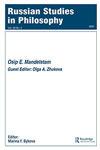苏联:民族形式与社会主义内容(文化、民族、阶级)的统一
IF 0.1
4区 哲学
Q4 Arts and Humanities
引用次数: 0
摘要
本文的主题是早期苏联文化政策在国家建设领域的概念核心,正如斯大林主义著名的“内容上是社会主义的,形式上是民族的”,它不仅向我们“隐藏”了真实的社会实践,而且让我们能够接触到它们;2) 有机会将其描述力不仅扩展到社会主义现实主义文化,而且扩展到社会主义跨国空间中的生产性质;3)尽管意识形态语言具有操纵性,可以通过多阶段的修辞动作来避免任何有意义的定义,但该表述并不像看上去那么模糊和空洞。这篇文章描述了这个短语所产生的逻辑修辞效果,以及它试图回应的社会文化问题。本文分析的主要材料是布尔什维克领导人在民族问题和文化建设问题上的工作。其理论框架是对苏联跨国政治计划具体特征的当代研究。本文章由计算机程序翻译,如有差异,请以英文原文为准。
USSR: The Union of National Form and Socialist Content (Culture, Nation, Class)
ABSTRACT The subject of this article is the conceptual core of early Soviet cultural policy in the field of nation-building, as indicated by the well-known Stalinist formulation “socialist in content, national in form.” In addition to being well recognizable, there are several reason to address this phrase: 1) an interest in the Soviet regime’s language of self-description, which not only “conceals” real social practices from us, but also gives us access to them; 2) the opportunity to extend its descriptive power not only to the culture of socialist realism but also to the nature of production in the multinational socialist space; and 3) the formulation is not as vague and empty as it may seem, despite the manipulativeness so characteristic of the language of ideology that allows one to avoid any meaningful definition through multi-stage rhetorical moves. This article describes both the logical-rhetorical effects produced by the phrase and the sociocultural problems it was attempting to respond to. The main material for the present analysis is the work of Bolshevik leaders on the nationalities question and on issues of cultural construction. Its theoretical framework is contemporary research focused on the specific features of the Soviet multinational political project.
求助全文
通过发布文献求助,成功后即可免费获取论文全文。
去求助
来源期刊

RUSSIAN STUDIES IN PHILOSOPHY
PHILOSOPHY-
CiteScore
0.10
自引率
0.00%
发文量
14
期刊介绍:
Russian Studies in Philosophy publishes thematic issues featuring selected scholarly papers from conferences and joint research projects as well as from the leading Russian-language journals in philosophy. Thematic coverage ranges over significant theoretical topics as well as topics in the history of philosophy, both European and Russian, including issues focused on institutions, schools, and figures such as Bakhtin, Fedorov, Leontev, Losev, Rozanov, Solovev, and Zinovev.
 求助内容:
求助内容: 应助结果提醒方式:
应助结果提醒方式:


